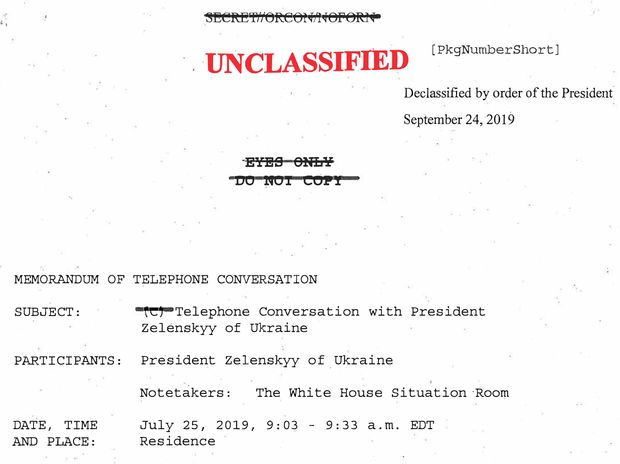Confused by the Impeachment Process?
Here’s a quick look at the process
October 4, 2019
Speaker of the House Nancy Pelosi recently announced an impeachment inquiry against President Donald Trump. Many news outlets have covered the scandal and it seems that new information is being released every second.
The US Senate’s website describes the general idea of the impeachment process:
“If a federal official commits a crime or otherwise acts improperly, the House of Representatives may impeach—formally charge—that official. If the official subsequently is convicted in a Senate impeachment trial, he is removed from office.”
But what exactly does this all mean?
Impeachment derives from article 2, section 4 of the constitution:
“The President, Vice President and all Civil Officers of the United States, shall be removed from Office on Impeachment for, and Conviction of, Treason, Bribery, or other high Crimes and Misdemeanors.”
Many may think of “impeachment” as interchangeable with the idea of removing a president from office. However, removing someone from office is a long, multi-step process of which impeachment is only a part. The House of Representatives is responsible for impeachment, and the Senate for trying the cases that result.
Speaker Pelosi recently announced an “impeachment inquiry.” Essentially, the House of Representatives is deciding whether to pursue impeachment. Six committees in the House are investigating the president and will submit what they find to the House Judiciary Committee (which is responsible for matters relating to impeachment). If enough evidence is found that Trump has done something wrong, a vote will be held on impeachment. A simple majority — 218 representatives — can impeach the president.
If the president is impeached, the process moves to the Senate. A trial is held in the Senate and a vote is held on whether to convict the President. The reason behind this is that convicting a president should be a bipartisan action. There are a few requirements for the trial in the Senate. The senators must be on either Oath or Affirmation (promising to tell the truth). The Chief Justice must preside over the trial because it is thought that the Vice President could have a vested interest in the situation. The president is removed from office if two thirds of senators vote to convict them.
So, has this ever happened before?
Yes and no.
Impeachment has occurred twice, in the cases of Andrew Johnson (1868) and Bill Clinton (1998-99). If you were wondering what happened to Richard Nixon, he resigned before he could be impeached. Many people use this to support their belief that Donald Trump will not be removed from office. It is worth noting that the Senate is controlled by Republicans, so a 2/3 vote to impeach Trump is unlikely.
However, the House Democrats pursuing impeachment know this. If they believe the Senate will not convict Trump, and still are in favor of impeaching, they likely truly believe they are doing the right thing outside of simple political motivation.
So why is pursuing impeachment on the table?
Essentially, Trump made a phone call to Ukraine President Volodymyr Zelenzky — and then a whistleblower filed a complaint about this call; a whistleblower describes someone who exposes some time of wrongdoing, abuse of power, something illegal, or the like within their organization or workplace.
 Specifically, the person claimed that Trump used “the power of his office to solicit interference from a foreign country” in the context of the upcoming 2020 election. Not surprisingly, this was denied by the President as he claimed he would release a transcript. However, the information released by the White House was actually notes taken about the conversation – as opposed to a word-for-word transcript. After this, the complaint made by the whistleblower became public. To further add suspicion, Trump revoked $391 million in aid to Ukraine only a few days before this phone conversation took place. Many consider this to be a “bargaining tool,” but this was denied by Trump.
Specifically, the person claimed that Trump used “the power of his office to solicit interference from a foreign country” in the context of the upcoming 2020 election. Not surprisingly, this was denied by the President as he claimed he would release a transcript. However, the information released by the White House was actually notes taken about the conversation – as opposed to a word-for-word transcript. After this, the complaint made by the whistleblower became public. To further add suspicion, Trump revoked $391 million in aid to Ukraine only a few days before this phone conversation took place. Many consider this to be a “bargaining tool,” but this was denied by Trump.
 The transcript of the conversation noted that “Trump had urged Mr. Zelensky to investigate discredited corruption allegations against former Vice-President Joe Biden” in addition to his son. The basis for this phone call was likely based on a connection between the Bidens and Ukraine. In 2015, Ukraine’s top prosecutor was investigating the company Joe Biden’s son was working for, and Trump and his supporters seem to think Biden encouraged him to be fired because of this.
The transcript of the conversation noted that “Trump had urged Mr. Zelensky to investigate discredited corruption allegations against former Vice-President Joe Biden” in addition to his son. The basis for this phone call was likely based on a connection between the Bidens and Ukraine. In 2015, Ukraine’s top prosecutor was investigating the company Joe Biden’s son was working for, and Trump and his supporters seem to think Biden encouraged him to be fired because of this.
Biden previously mentioned the idea of revoking aid until the prosecutor was fired. However, so far no evidence has been found suggesting Biden took any action benefiting his son in office. Allies of Biden will likely claim his work was a part of an anti-corruption initiative. This claim could be reasonable considering this initiative was backed by the US Government, allies in Europe and the International Monetary Fund.
Many find this especially concerning, as Joe Biden is often considered the most likely Democratic Presidential Nominee, despite Elizabeth Warren often polling near or above him.
If you think this sounds familiar, you would be right. There was additional controversy over the interference of Russia with the 2016 Election, but the public is left without a truly clear idea of what happened, as Robert Mueller did not find enough evidence to prove guilt, and perhaps of more concern, he did not find enough evidence to definitively say the president committed no crimes.
However, this particular situation truly comes down to Trump asking for what could be foreign interference in an upcoming election. As we speak, the issue is being investigated on Capitol Hill as the House partakes in an impeachment inquiry. If impeachment does occur, it could be a drawn out process that stops in the Senate. At this point, we don’t know what will happen to Trump. What is important is finding out if there is a basis for impeachment, and following procedures properly in the process. The process could be a long and tedious one, but it is important that we keep up and understand the situation.








Politics • Oct 4, 2019 at 2:07 pm
Very informative article! LOVE IT